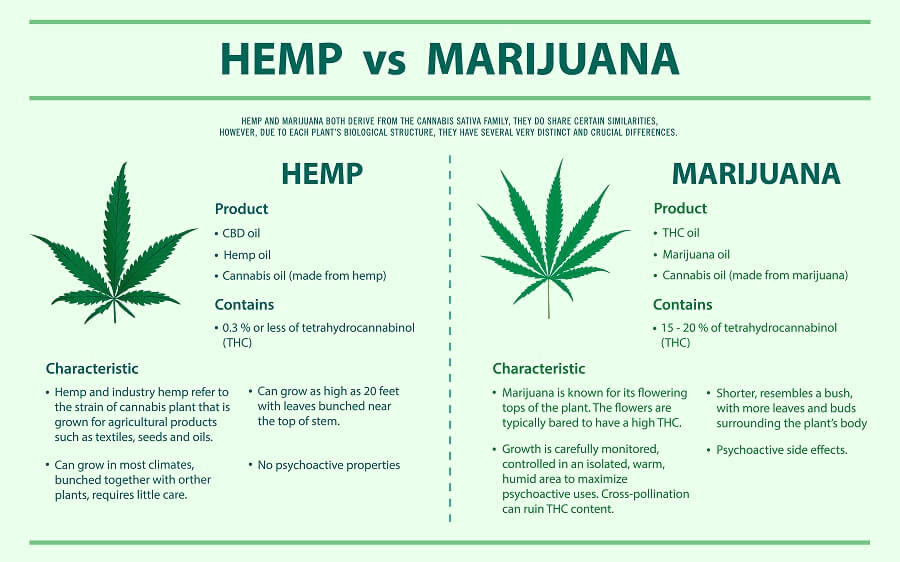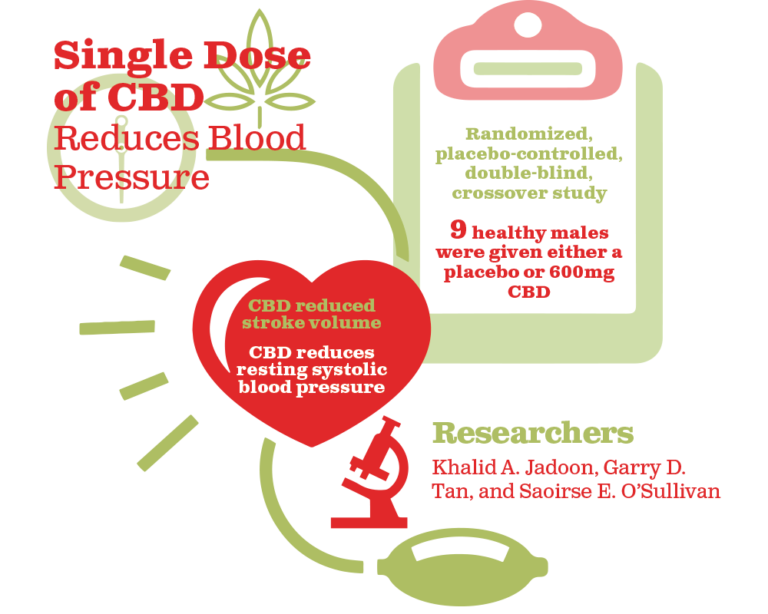Before we dive into what research has shown regarding CBD (cannabidiol) and hypertension (high blood pressure or HPB) it may be helpful to first discuss what exactly CBD is and what it isn’t.
CBD: What Is It?
Many people are still under the impression that marijuana, cannabis and hemp are just various names for the same thing, however that’s not true. Marijuana and hemp are actually both classes of cannabis, and each is grown and harvested for different purposes.
“Marijuana” is any cannabis plant with abundant amounts — technically, more than 0.3 percent — of the mind-altering drug THC. Though 11 states and Washington, D.C., have legalized recreational marijuana, this version of cannabis remains federally illegal and classified as a schedule 1 drug by the Drug Enforcement Administration.
“Hemp,” by contrast, cannot legally contain more than 0.3 percent THC. There are almost no restrictions on the hundreds of other compounds made by the plant, such as terpenes (which are responsible for marijuana’s “distinctive” aroma).

Both marijuana plants and hemp plants can produce CBD, but for our purposes here we will be only discussing CBD derived from the hemp plant which contains less than 0.3% THC and does not produce any of the psychoactive affects of marijuana. With that said…
What Is Hypertension
Hypertension, or high blood pressure, affects 33% of adults over the age of 20 – 1 in every 3. Those numbers double to 66% for adults that are in their mid-60s or older. Tens of millions face suffering from high blood pressure in the United States alone. High blood pressure is a measurable, dynamic vital sign we can observe in all humans. The numbers indicate how much pressure is being applied to the blood flow throughout the internal vein network of the human body. As you move throughout your day, this blood pressure level changes based on all the emotional, physical, and environmental stimuli around you.
While your blood pressure fluctuates, there’s a normal range that it can fall and rise within. Roughly one-third of American adults rise well above the normal range for blood pressure levels. Chronically elevating pressure in one of the thinnest networks throughout the body, hypertension is what contributes to over 400 thousand deaths annually. It’s a high-risk, long-term condition that plagues millions of people across the globe. A vicious rising trend with no end in sight, we look at alternative remedies that may aid in relief for some symptoms associated with high blood pressure – or even high blood pressure itself. Many are turning away from pharmaceuticals for a more natural approach, which is just one of the reasons so many are picking up CBD.
CBD and It’s Affects on High Blood Pressure

When people suffer from emotional or physical stress, our bodies release a hormone called cortisol. High levels of cortisol can raise blood pressure. CBD oil has been shown to lower blood pressure by not only reducing stress and anxiety levels, but also by dilating blood vessels, allowing more blood flow. This study of 11 participants showed that volunteers taking CBD saw a significant reduction in cortisol production when given 300mg and 600mg of CBD compared to the placebo control. In a 2017 study, a single dose of 600mg of CBD oil or placebo was administered to nine healthy male volunteers. The resulting data showed that acute administration of CBD reduced resting blood pressure compared to the placebo. The men were then given a series of stress tests to increase heart rate. The men who were given 600mg of CBD had lower stress-induced blood pressure spikes than the control group.
Additional Ways In Which CBD Can Help With Hypertension
There are several health benefits of CBD that could indirectly help with hypertension, among them:
Anti-Anxiety
Anxiety can catalyze a rapid heart rate and palpitations, leaving you at risk for high blood pressure and heart disease. CBD oil has been shown to reduce anxiety in animal studies by the National Institute for Drug Abuse (NIDA). This study demonstrated that symptoms that accompany anxiety, like high blood pressure and rapid heart rate, were improved by use of CBD.
Reduces Inflammation
Inflammation doesn’t only occur in your joints. In fact, research shows that CBD oil can reduce inflammation in the heart and blood vessels in the brain. Called a “vasorelaxant” by researchers, CBD oil’s anti-inflammatory properties may lower blood pressure by allowing the free flow of blood through your heart, arteries and veins.
Analgesic Properties
According to the National Institute of Health (NIH), acute pain can lead to high blood pressure. Because CBD acts on the pain receptors in the brain, the pain-relieving properties of CBD could lead to decreased blood pressure.
Better Sleep
As CBD reduces stress, you may see an increase in your quality of sleep. CBD has been found to interact indirectly with CB1 and CB2 receptors in your endocannabinoid system (ECS). These two receptors are considered by current research to be the part of the ECS that aids with pain relief, inflammation, relaxation, and therefore sleep. One study published in January of 2019 called “Cannabidiol in Anxiety and Sleep: A Large Case Series,” points to CBD as a hopeful sleep aid. While it looked at a small pool of only 72 adults, the study found “sleep scores improved” within the first month of CBD use in 66.7 percent of the patients. The study attributes this to CBD’s “calming effect in the central nervous system.”
Conclusion
While CBD may not be a replacement for exercise and a healthy diet when it comes to hypertension, it’s nice to know you might be able to lower your blood pressure with a few drops under the tongue.
Even with the positive research currently ongoing regarding CBD, no absolute medical conclusions should be made. What we do know is that CBD has shown promise both within the scientific community and even more-so anecdotally among current CBD users. And with virtually no side effects it can be a safe and natural alternative to traditional medications and treatments.
PLEASE NOTE
The contents of this blog are provided for informational purposes only and are not intended as a substitute for the consultation, diagnosis and/or medical advice and treatment of a qualified physician or healthcare professional. As with any product, please consult your care provider if you have any concerns prior to use.




CBD for Psoriasis | How and Why - Sinplicity
[…] impact on people’s mental well-being. CBD has been found to relieve the stress, anxiety and even hypertension that may be both the cause of and the result of […]
CBD for Seniors - Why They Can and Should - Sinplicity
[…] the inflammation found in the blood vessels of those suffering from cardiovascular disease and high blood pressure, potentially reducing the risk of heart attack and stroke over time as well as decreasing blood […]
CBD For Workouts and Fitness | Preparation & Recovery - Sinplicity
[…] old) as well as pets to help with everything from anxiety and stress to physical conditions such as hypertension, TMJ and even psoriasis and psoriatic arthritis. Now, CBD is also gaining significant traction in […]